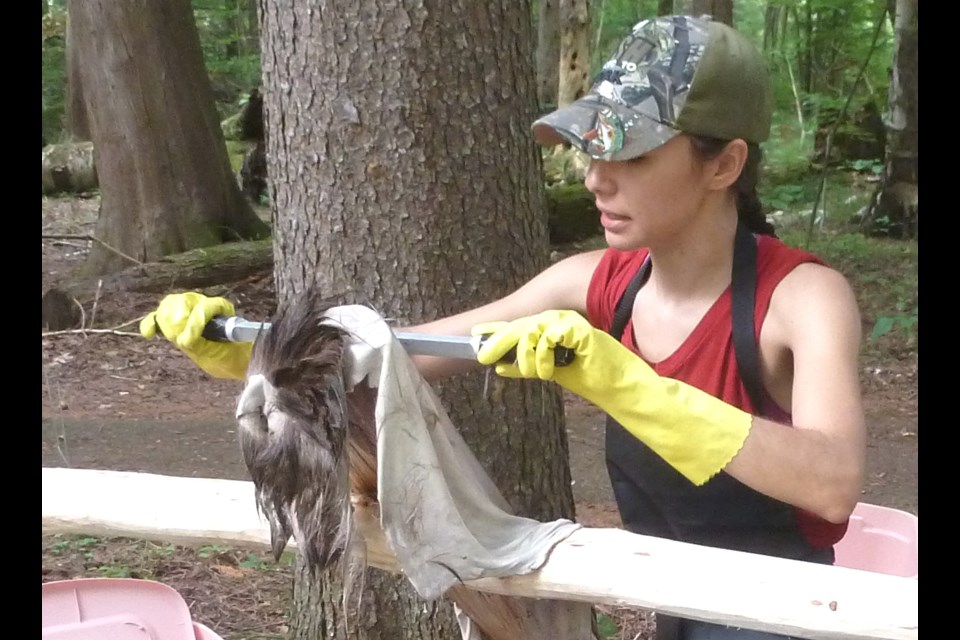MIDHURST - For a solid week, Springwater Provincial Park will host a traditional deer hide brain tanning camp.
The 2021 Niizh Manidook Hide Camp operates on a number of levels for its approximately 40 participants.
Brain tanning is a process involving rubbing an emulsified solution of animal brain tissue and water into a wet rawhide, deer or moose. This helps break down the membranes that have to be removed before the hide can be used for clothing and footwear.
“You have to honour their bodies,” said Chelsey Bouchard of Six Nations about moose and deer, working on a hide Sunday morning. “It’s an opportunity to build relationships.”
“It’s going to be gruelling, but it’s going to be awesome,” said Storm French, with the Chippewas of the Thames near London, of the Aug. 7-15 camp.
Beze Gray from Aamjiwnaang First Nation, near Sarnia, one of the camp’s co-facilitators, said it’s a very practical process.
“You put the brains on, then soften it, then smoke it and soften it some more,” Gray said of the hide. “The brain is used to treat the hide, which is full of oils. There are not a lot of hide tanners.”
“We can make personal products - moccasins, clothing, anything you’d use fabric for. They (camp-goers) make it for themselves.”
Jeff Monague, park manager Springwater Provincial Park, Beausoleil First Nation, said the hide camp is also a sign of the times.
“The camp is being run to assist Indigenous youth in learning about the Indigenous art of hide preparation,” he said. “But it is tied to the pandemic and how necessary it is for people to learn some of the old ways of living on the land.”
Hide tanning can happen in the bush, in backyards, on the land, in rural and urban settings, remote places, public spaces and Native Indian land. It is seen as an act of love for the past, present and future.
Niizh Manidook Hide Camp also prioritizes creating safer space for Indigenous youth aged 16-29 and Two Spirit/2SLGBTQQIA (Two-Spirit, lesbian, gay, bisexual, transgender, queer, questioning, intersex and asexual or androgynous) community members.
Two Spirit refers to a person who identifies as having both a masculine and a feminine spirit; it is used by some Indigenous people to describe their sexual, gender and/or spiritual identity.
Niizh Manidook means Two Spirit in Anishinaabemwin, or the Ojibway language.
The hide camp, in its second year, is a new cultural revitalization initiative aimed at restoring and preserving the traditional tanning in the shared Lake Huron, Lake Erie and Lake Ontario watershed territories.
Part of the camp’s manifesto is restoring the value of traditionally tanned hides through sharing knowledge, which includes remembering, restoring and reclaiming Indigenous wisdom. Hide tanning returns purpose and value to deer and moose hides in Indigenous homelands.
But the future of hide tanning relies on protecting the water and land of the Great Lakes, as well as honouring animal spirits and ancestors who live there.
People were encouraged to apply for the hide camp as ‘pods’ to promote social distancing. Pods are two-five other people you already regularly share space with - like your social bubble, family, kin, friends. Those in pods were encouraged to camp together, cook together, eat together and work on hides together.
Camping is free at Springwater Provincial Park for participants aged 16-29. Older ones were asked to sleep off-site.
Niizh Manidook Hide Camp is funded by the Ontario Trillium Foundation’s Youth Opportunities Fund.
